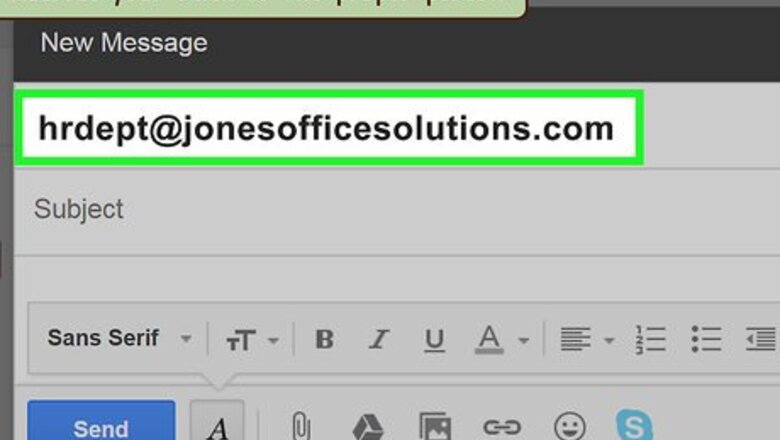
views
- You will typically find your HR department's email address in your company directory.
- Describe the problem precisely, without including dates, proof, and other details.
- Request an in-person meeting to address additional concerns.
Writing and Sending
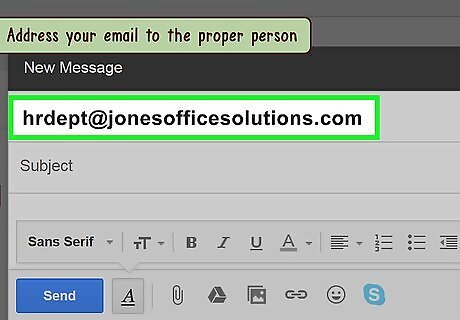
Address your email to the proper person. Check the human resources directory and see if there’s a person assigned to handle the type of problem you need addressed. There may also be a point of contact assigned to your department in the company. If you’re concerned about your issue being taken seriously, you can also reach out directly to the head of human resources. Double check that only the person you want to contact is addressed in the email. Especially if this is a private or sensitive issue, you don’t want to send it to the wrong person by accident. Be especially careful to remove any lists that would send the email to a set group of employees.
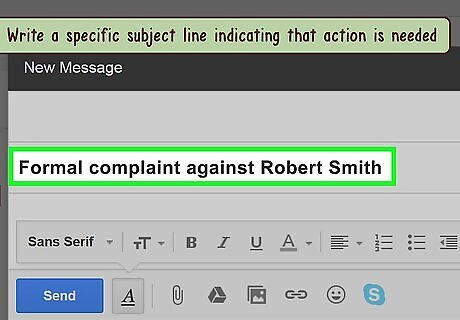
Write a specific subject line showing that action is needed. A clear subject line communicating both your problem and the level of urgency you’re assigning to it will help human resources prioritize your problem. If you leave this line blank or unclear, your correspondence may get buried in someone’s inbox. Use lines such as: “Legal Problem - Action Required,” “Personal Circumstances Changing - Immediate Attention Needed,” “Urgent Policy Question,” or “Recent Interview - Thank You.”
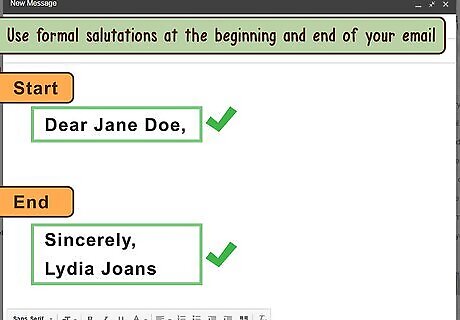
Use formal salutations at the beginning and end of your email. You want to set a formal and professional tone early on in this conversation. This will help human resources know that you’re treating the issue seriously. Even if you know the representative personally, remember that this is a professional, rather than just a friendly, discussion. Start with “Dear [full name of the representative]” and end with “Sincerely” or "Best regards" or “Thank you for your time, [Your full name].” It's also a good idea to end the email with "Thank you for your time."
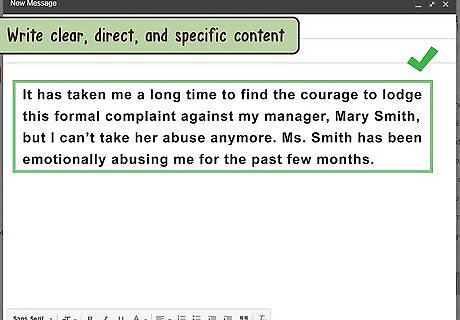
Write clear, direct, and specific content. Keep your sentences short and to the point. Don’t provide more information than is necessary, as you don’t want the reader to get bogged down in the email. Don’t include any details that could confuse human resources about your issue. You can address complicated details in person.
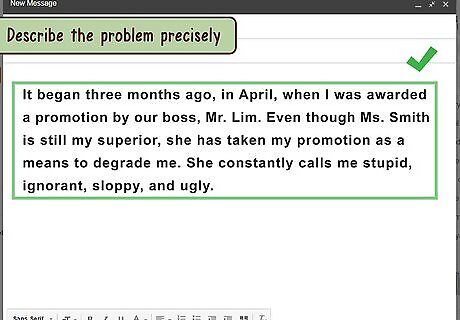
Describe the problem precisely. Explain the exact nature of your problem. Provide a timeline of when the issue started or will start. Clarify whether you think this is a legal problem or an issue that can handled by the company itself. If you’re contacting human resources to ask about job opportunities, you won’t be introducing a problem. Rather, introduce yourself, and explain your past contact with the company. Be clear about what actions you expect or would like the representative to take.
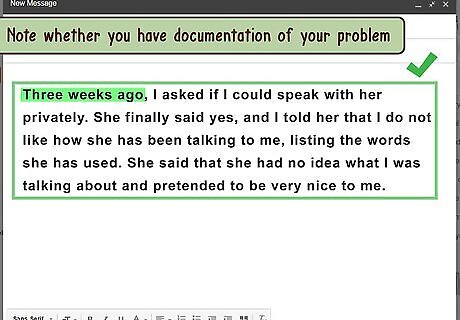
Note whether you have documentation of your problem. Human resources will want to know right away how to address legal or policy problems. Your documentation may affect their response, as it will help clarify both the seriousness of the issue and the legal repercussions a particular employee may be facing. Make your representative aware of any and all “proof” you have in your possession, and offer to bring it to an in-person meeting. If possible, you’ll want proof of any legal problems to present to human resources. Unfortunately, most human resources departments will try to protect the company if they can. If you’re experiencing harassment or discrimination, keep a record of the dates of the incidents and save any written correspondence that includes incriminating language. Retain both electronic and paper copies of any documentation you provide to human resources. You should keep the original and provide human resources with copies.
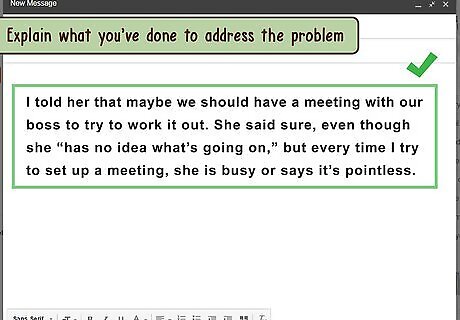
Explain what you’ve done to address the problem. You may have already tried to solve the issue before you contacted human resources. Perhaps you had a conversation with your boss or co-worker, or even notified them that you’d be contacting human resources. The representative will appreciate having this information, as it will help them understand who’s already aware of the problem. For issues of changing personal circumstances, this communication may feel less formal. If you’re going on maternity or paternity leave, for example, you’ve likely already informed your boss of your status and are simply following through with human resources.
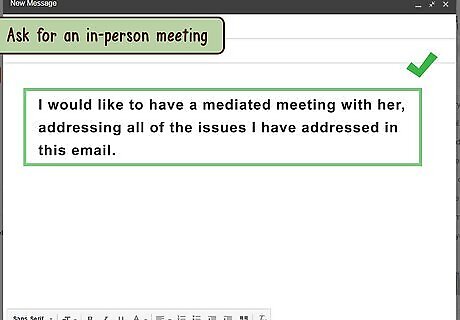
Ask for an in-person meeting. A meeting where you sit face-to-face with your representative will help you discuss the problem in detail. This will provide the representative with the opportunity to ask any follow-up or clarification questions. Your email is the perfect place to begin scheduling that critical meeting. Inform them of blocks in your schedule, and ask them to plan accordingly.
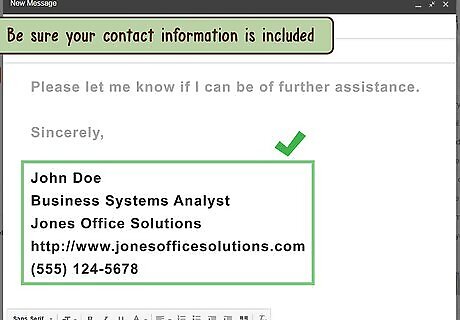
Be sure your contact information is included. Human resources may want to contact you via phone, so include several methods of contact at the bottom of the email. This information can go directly below your name after you sign off from the correspondence. Double check the accuracy of the phone numbers and emails you’ve provided.
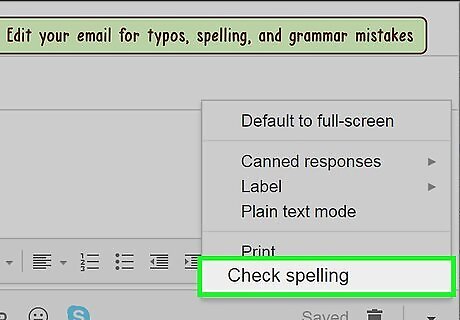
Edit your email for typos, spelling, and grammar mistakes. Most email services have a spell-check service. Next, read through your email to catch grammatical mistakes, missing words, and issues of clarity.
Following Up
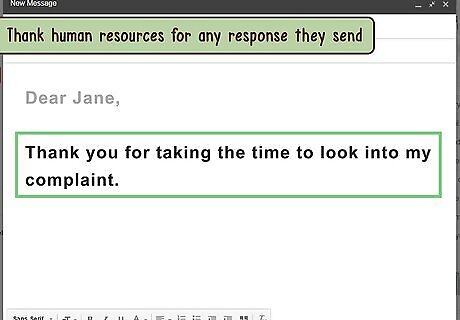
Thank human resources for any response they send. First, thank the representative for taking the time to investigate your case, as this will immediately set a tone of courtesy in your conversation. Be sure to reply to any response human resources sends quickly. This will indicate that you remain concerned about the problem, and it should also communicate your desire to address it sooner rather than later.

Organize any necessary materials for your in-person meeting. Prepare yourself for the meeting by creating a special file folder containing any documents you plan to bring. If you have a policy question, bring the employee handbook with the specific policies bookmarked. This will help the meeting run smoothly once you arrive.

Consider hiring legal counsel if you’re bringing up legal issues. If you’re worried about protecting yourself from any actions the company may take against you, talk to a lawyer. They can provide you with information about your rights, and you may decide to bring them to any in-person meetings. You might want to inform human resources of your plans to employ a lawyer if you choose to go this route. Be sure you’re aware of the costs associated with hiring a lawyer. Most will be costly, so you’ll need to weigh these budgetary concerns with your need for legal protection.
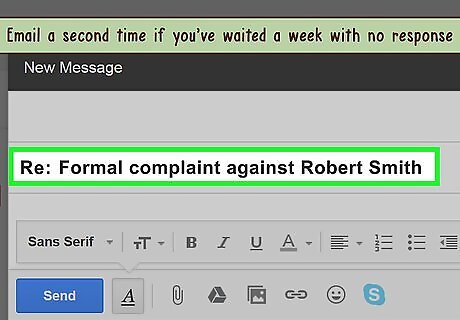
Email a second time if you’ve waited a week with no response. A week is generally considered an appropriate amount of time to wait before sending a follow-up email. If you’re dealing with an especially urgent problem, you can send a follow-up after 24 hours. Rather than worrying that you’re nagging your representative, remember that they have many responsibilities. They may need a reminder that you’re one of them.
When to Contact HR

Solve the problem on your own if you can. If you have a simple and non-legal issue that doesn’t relate to company policy, you may be able to address it on your own. If possible, discuss the problem with your boss or co-workers to troubleshoot the issue with them. Human resources will appreciate knowing any steps you took to find a solution before coming to them. If, for example, you feel your boss is scheduling you for too many weekends, talk to your boss first. You also don’t want to go to human resources with a non-critical complaint like “I don’t like my office space.”
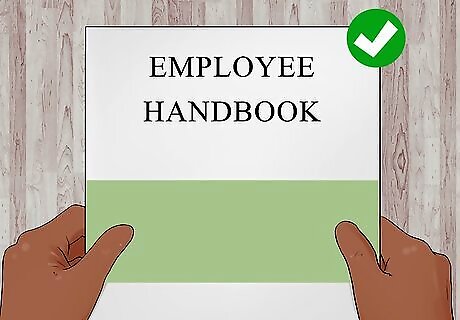
Review your employee handbook to check on your company’s policies. You may feel that you’re experiencing a violation of company policy. Before you contact human resources, re-read the specific policies having to do with your problem. You’ll want to be able to cite those examples in any discussions you have with human resources. For example, if you’re concerned you’re not receiving enough breaks during work hours, check the written rules on break times. It’s possible that your company only has an informal, rather than codified, break policy, which means that human resources can’t do much to help you in an official capacity.
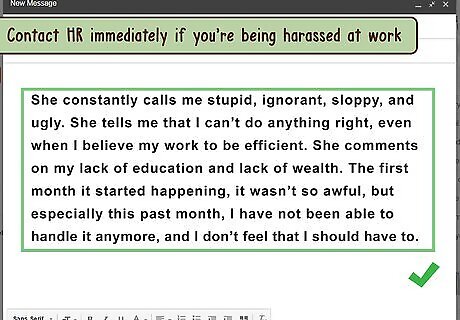
Contact human resources immediately if you’re being harassed at work. Do not hesitate to reach out if you’re experiencing any kind of verbal, physical, or sexual harassment from any source at work. You are legally protected from this kind of behavior, and human resources is obligated to help and protect you. Do not expect that human resources can have off-the-record conversations about these issues, however. Once you report it, they are required to act.
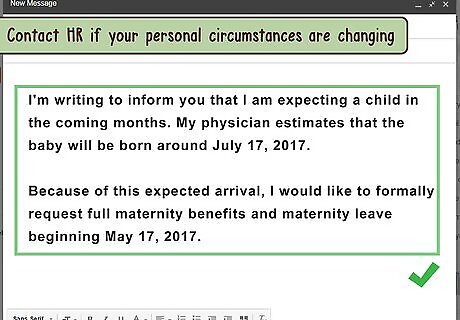
Contact human resources if your personal circumstances are changing. Human resources can help you plan for any upcoming changes in your work situation, such as if you’re getting ready to take maternity leave. They’ll be able to ensure you receive all your benefits and coverage. They can also contact people at the company who need to be made aware of your changing circumstances.
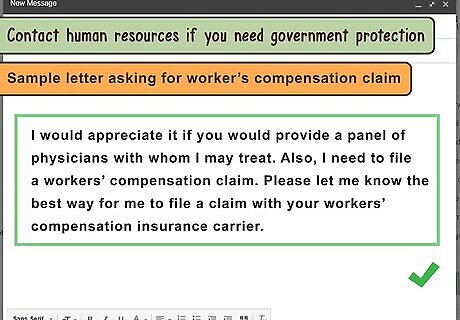
Contact human resources if you need government protection. Certain situations may arise at work that entitle you to protection or compensation from the government. If, for example, you’re injured on the job, human resources can help you coordinate coverage of your medical expenses. This will likely require you to fill out paperwork with human resources, so be prepared for this process.
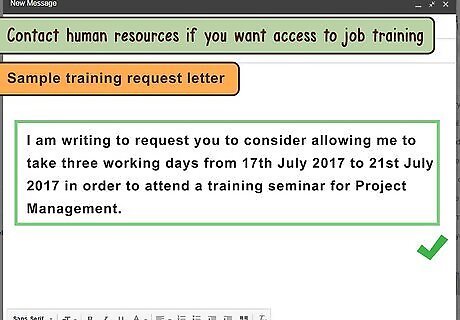
Contact human resources if you want access to job training. There may be training or mentorship programs available that would allow you to advance in your company. Human resources can provide you with any necessary information about these options and possibly coordinate your entrance into these programs. This could be a great opportunity to take your career to the next level.
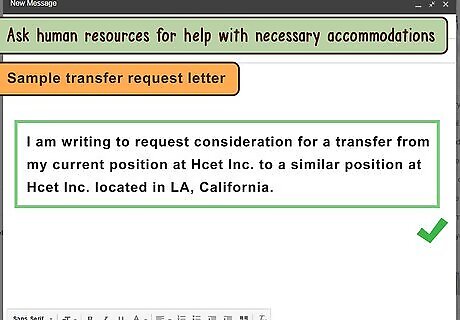
Ask human resources for help with necessary accommodations. Human resources can also help you address any individual needs you may have at work. Your work environment should include resources that allow you to enjoy the same opportunities to succeed as any other employee. If you feel that there aren’t appropriate disabled resources, for example, human resources will address this problem. The department can also work with you to ensure there’s a designated place for nursing mothers.
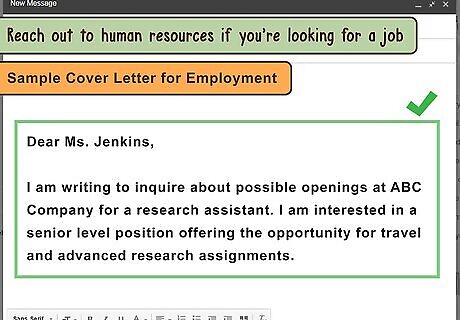
Reach out to human resources if you’re looking for a job. Occasionally, contacting a human resources representative at a particular company can allow you to receive information about current job openings or opportunities for informal, “informational” interviews with current employees. You can also contact human resources to say thank you for a recent interview you completed with their company. If you don’t receive a reply after a week, you can send one follow-up email. After that, you may need to let this company go.

Avoid contacting human resources with personal grievances. Remember that human resources works for the company first, so they’re not the people to go to if you just want to vent. While you absolutely shouldn’t avoid reporting any situations that make you feel uncomfortable or discriminated against, be careful to distinguish between issues that might simply be annoying or petty and more serious, legal problems.




















Comments
0 comment